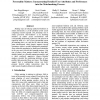93 search results - page 12 / 19 » Core empirical concepts and skills for computer science |
COMPUTER
2007
13 years 7 months ago
2007
and therefore should be implemented outside the sensory-motor system. This way, meaning for a concept amounts to the content of a symbolic expression, a definition of the concept ...
CSCW
2008
ACM
13 years 8 months ago
2008
ACM
Assistance – work carried out by one entity in support of another – is a concept of long-standing interest, both as a type of human work common in organizations and as a model...
CSCW
2004
ACM
14 years 25 days ago
2004
ACM
We present contextual collaboration, an approach to building collaborative systems that embeds collaborative capabilities into core applications, and discuss its advantages. We de...
HICSS
2007
IEEE
14 years 1 months ago
2007
IEEE
Finding ways of reducing undesired behavior in online interactions is at the forefront of the social computing research agenda. One promising way to reduce perceived “bad behavi...
SIGCSE
2010
ACM
14 years 2 months ago
2010
ACM
The “Hacker Curriculum” exists as a mostly undocumented set of principles and methods for learning about information security. Hacking, in our view, is defined by the ability...

